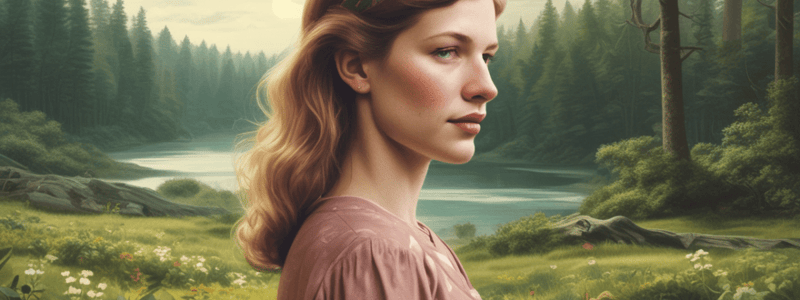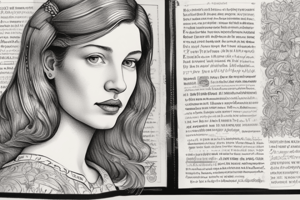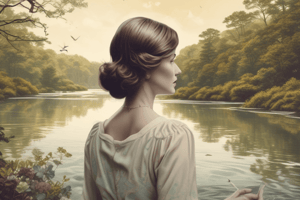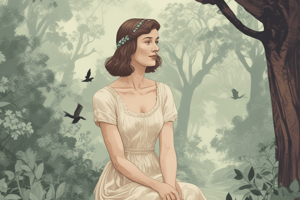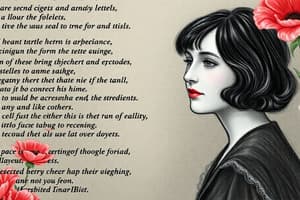Podcast
Questions and Answers
What is the main theme explored in 'Black Rook in rainy weather'?
What is the main theme explored in 'Black Rook in rainy weather'?
- The importance of natural beauty
- The power of love and relationships
- The need for inspiration and interplay between humanity and the natural world (correct)
- The struggle for survival in harsh environments
What effect does the use of commas in the line 'Although, I admit, I desire,' create?
What effect does the use of commas in the line 'Although, I admit, I desire,' create?
- A sense of urgency
- A sense of continuity
- A sense of excitement
- A stilted, hesitant tone (correct)
What is the purpose of the speaker's statement 'I do not expect a miracle / Or an accident'?
What is the purpose of the speaker's statement 'I do not expect a miracle / Or an accident'?
- To highlight the importance of the natural world
- To express their hope for inspiration
- To introduce their pessimistic outlook (correct)
- To set the tone for the rest of the poem
What literary device is used in the line 'backtalk / from the mute sky'?
What literary device is used in the line 'backtalk / from the mute sky'?
What is the speaker's attitude towards the natural world?
What is the speaker's attitude towards the natural world?
What is the significance of the speaker's description of the rook in the poem?
What is the significance of the speaker's description of the rook in the poem?
What is the significance of the speaker's description of the natural world as 'dull, ruinous landscape'?
What is the significance of the speaker's description of the natural world as 'dull, ruinous landscape'?
What is the tone of the speaker in the line 'But let spotted leaves fall as they fall / Without ceremony, or portent'?
What is the tone of the speaker in the line 'But let spotted leaves fall as they fall / Without ceremony, or portent'?
What is the effect of the use of sibilance in the line 'To set the sight on fire / In my eye, nor seek'?
What is the effect of the use of sibilance in the line 'To set the sight on fire / In my eye, nor seek'?
Flashcards
Poem Structure
Poem Structure
The poem uses structured stanzas with five lines each, except for the final line.
Hidden Rhyme
Hidden Rhyme
The poem uses similar consonant sounds at the end of lines.
Enjambment
Enjambment
The use of enjambment creates a sense of pace, separating ideas.
Caesurae
Caesurae
Signup and view all the flashcards
Imagery in Poem
Imagery in Poem
Signup and view all the flashcards
Relationship with Nature
Relationship with Nature
Signup and view all the flashcards
Inspiration Theme
Inspiration Theme
Signup and view all the flashcards
Black Rook Imagery
Black Rook Imagery
Signup and view all the flashcards
Speaker's Indifference
Speaker's Indifference
Signup and view all the flashcards
Speaker's Desire
Speaker's Desire
Signup and view all the flashcards
Inspiration from Mundane
Inspiration from Mundane
Signup and view all the flashcards
Connection's Frequency
Connection's Frequency
Signup and view all the flashcards
Divine Love Metaphor
Divine Love Metaphor
Signup and view all the flashcards
Cautious Hope
Cautious Hope
Signup and view all the flashcards
Rare Inspiration
Rare Inspiration
Signup and view all the flashcards
Study Notes
Poem Structure and Style
- The poem consists of structured stanzas, each with five lines, except for the final line.
- Hidden rhyme is used through similar consonance at the end of each line.
- Enjambment is used to create pace, and distinct caesurae are used to separate ideas.
- The poem features perceptively chosen imagery, striking aural qualities, including sibilance and assonance.
Themes and Ideas
- The poem explores the speaker's relationship with the natural world and its capacity to inspire.
- A need for inspiration is a central theme, as well as the interplay between humanity and the natural world.
- The poem also touches on the idea of divine power and a writer's process.
Black Rook Imagery
- The black rook is used to create distinct imagery, with verbs like "hunches" conveying a sense of bleakness and unwelcomingness.
- The rook's actions, such as "arranging and rearranging its feathers," create a sense of monotony and dullness.
Speaker's Tone and Desire
- The speaker's tone is one of indifference and a lack of expectation, refusing to place hope in the natural world.
- However, the speaker admits to desiring "occasionally, some backtalk / From the mute sky."
- The speaker is hesitant and nervous about the connection from the natural world, using personification to convey their desires.
Inspiration and Connection
- The poem suggests that inspiration can come from ordinary objects, such as a kitchen table or chair.
- The speaker seems reassured that connection can happen "now and then," even in a dull and ruinous landscape.
- The natural world's blessing is likened to a divine love, with the speaker walking "wary" and "politic" to avoid building up their own expectations.
Final Thoughts
- The poem concludes with the speaker waiting for the "rare, random descent" of inspiration from the natural world.
- The speaker is cautious in their hopes, using phrases like "whatever angel" to convey a sense of hesitation.
- Despite this, the poem suggests that miracles can occur, and the speaker is willing to wait for that rare connection.
Poem Structure and Style
- The poem consists of structured stanzas, each with five lines, except for the final line.
- Hidden rhyme is used through similar consonance at the end of each line.
- Enjambment is used to create pace, and distinct caesurae are used to separate ideas.
- The poem features perceptively chosen imagery, striking aural qualities, including sibilance and assonance.
Themes and Ideas
- The poem explores the speaker's relationship with the natural world and its capacity to inspire.
- A need for inspiration is a central theme, as well as the interplay between humanity and the natural world.
- The poem also touches on the idea of divine power and a writer's process.
Black Rook Imagery
- The black rook is used to create distinct imagery, with verbs like "hunches" conveying a sense of bleakness and unwelcomingness.
- The rook's actions, such as "arranging and rearranging its feathers," create a sense of monotony and dullness.
Speaker's Tone and Desire
- The speaker's tone is one of indifference and a lack of expectation, refusing to place hope in the natural world.
- However, the speaker admits to desiring "occasionally, some backtalk / From the mute sky."
- The speaker is hesitant and nervous about the connection from the natural world, using personification to convey their desires.
Inspiration and Connection
- The poem suggests that inspiration can come from ordinary objects, such as a kitchen table or chair.
- The speaker seems reassured that connection can happen "now and then," even in a dull and ruinous landscape.
- The natural world's blessing is likened to a divine love, with the speaker walking "wary" and "politic" to avoid building up their own expectations.
Final Thoughts
- The poem concludes with the speaker waiting for the "rare, random descent" of inspiration from the natural world.
- The speaker is cautious in their hopes, using phrases like "whatever angel" to convey a sense of hesitation.
- Despite this, the poem suggests that miracles can occur, and the speaker is willing to wait for that rare connection.
Studying That Suits You
Use AI to generate personalized quizzes and flashcards to suit your learning preferences.
Description
Explore Sylvia Plath's poem, Black Rook in Rainy Weather, and its themes of inspiration, humanity, and divine power. Analyze her writing style and unique use of structured stanzas and hidden rhyme.
